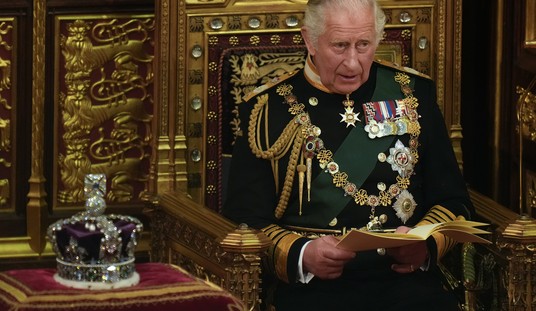Standing before the Democratic National Convention in 1896, William Jennings Bryan delivered what would be the most important speech of his life. For years he’d argued that American farmers were being crushed by debt due to the country’s inflation-busting, de facto gold standard. A bimetallic standard that included silver, he bellowed, would provide the necessary monetary growth needed to make rural debt repayments easier. Like most of Bryan’s speeches, the religious overtones were inescapable, but unlike most of his speeches, this one would endure.
“Having behind us the producing masses of this nation and the world, supported by the commercial interests, the laboring interests and the toilers everywhere, we will answer their demand for a gold standard by saying to them: You shall not press down upon the brow of labor this crown of thorns, you shall not crucify mankind upon a cross of gold.”
When he concluded,
…Bryan stretched out his arms in a Christ-like manner for five seconds, while the crowd remained quiet. According to the New York World, at that point everyone seemed to go mad at once and shrieked and rushed the stage. The New York Times commented that “a wild, raging irresistible mob” had been unleashed.
Bryan would go on to take the Democratic nomination for President.
Whatever you might think of William Jennings Bryan’s progressive politics — and I’m sure Glenn Beck would be hesitant to invite a comparison — there’s no doubt that a common element between the perennial Presidential candidate and Beck, his latter-day conservative counterpart, exists: the populist joining of religion and politics in a period of economic anxiety. For Bryan, the seemingly inescapable clutches of rural debt pushed a national conversation about the basis of our monetary policy; for Beck, the seemingly inescapable clutches of public debt is pushing a national conversation about the basis of our fiscal policy.
And in both cases, religion plays an important role in explaining their central figures’ rhetorical appeals. Bryan was a fervent Presbyterian congregant whose opponents described as a religious fanatic surrounded by left-wing anarchists. Beck is a fervent Mormon convert whose opponents describe as a religious fanatic surrounded by… right-wing radicals.
While sharing the same rhetorical means, Bryan and Beck starkly diverge on their policy objectives. Long gone is the Cross of Gold, whose investment as a valuable metal Beck advertises daily. Beck sees America as facing what amounts to a Cross of Debt, a national albatross weighing on the futures of his children and all of our children. Inflation is the problem, not the solution, and year after year of profligate Congresses only makes the devaluation of the American dollar all the more an acute problem.
Beck’s Restoring Honor rally was stunningly (and unexpectedly) apolitical in its tone, but its religious principles no doubt advance the ball for restoring fiscal order to our federal government, among other responsibility-related causes. And his message is entirely consistent with another closely related movement. Many causes are subsumed into the Tea Party coalition, but fundamentally they boil down to this: the retrieval of national greatness through the resurrection of personal responsibility as an ennobling and socially important value. To Tea Partiers, the power of faith — whether in ourselves, in an infinite power from which men and women draw strength, or both — is what will bring our country, and ourselves, Home.
In fact, that Christian revivalism is re-entering the public square through the person of Beck should fascinate everyone. Bryan’s Presbyterianism had long been considered within the mainstream of American religion, yet, Beck’s Mormonism has not always been so accepted, as at least one Presidential candidate appreciated. Who would have predicted two years ago that one of the most powerful Christian leaders in the country — a role that is secondary, I might add, to Beck’s role as a pundit — would be a member of the Church of Jesus Christ of Latter Day Saints? To recall one of the more favorite call-backs around Hot Air, you know who that benefits? I think you do.
How Beck’s Restoring Honor rally will be interpreted by history, only time will tell, but Beck’s political and religious imprint on the American landscape, at least for the near term, seems undeniable. Beck doesn’t seem to have any illusions about his own role in the larger movement in which he’s a part; indeed, Bryan’s failure as a candidate did not negate the very real power that he commanded during the latter part of the 19th century and early part of the 20th, and Beck seems to understand that he can be more useful outside of elected office than by trying to get into it.
I have no desire to be president of the United States. Zero desire. I don’t think that I would be electable. And there are far too many people that are far smarter than me to be president. I’d like to find one with some honor and integrity. I haven’t seen them yet, but they’ll show up.
Of course, only we can answer those prayers.
—–
Oh, and another thing: I’m on Twitter.
This post was promoted from GreenRoom to HotAir.com.
To see the comments on the original post, look here.








Join the conversation as a VIP Member